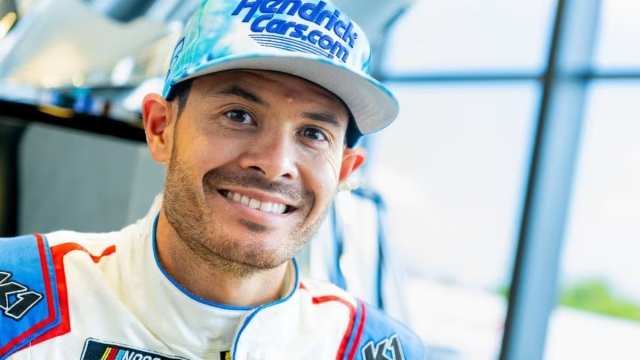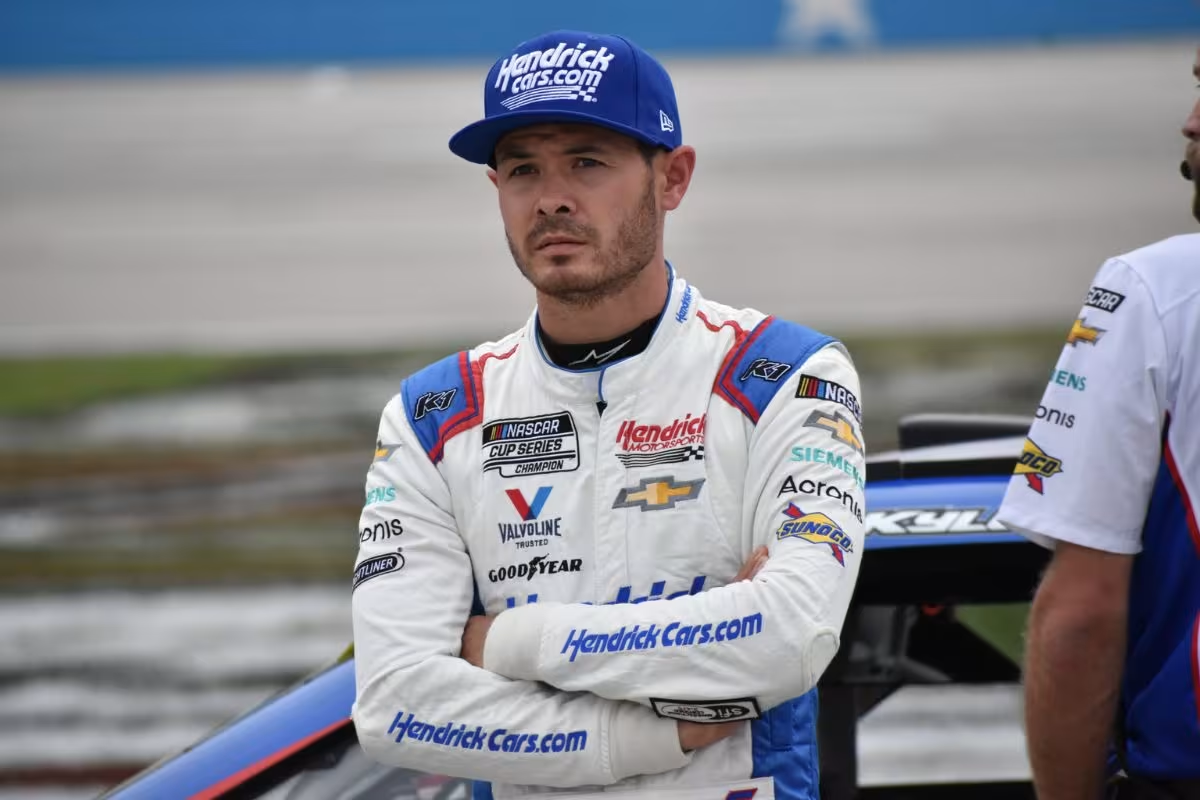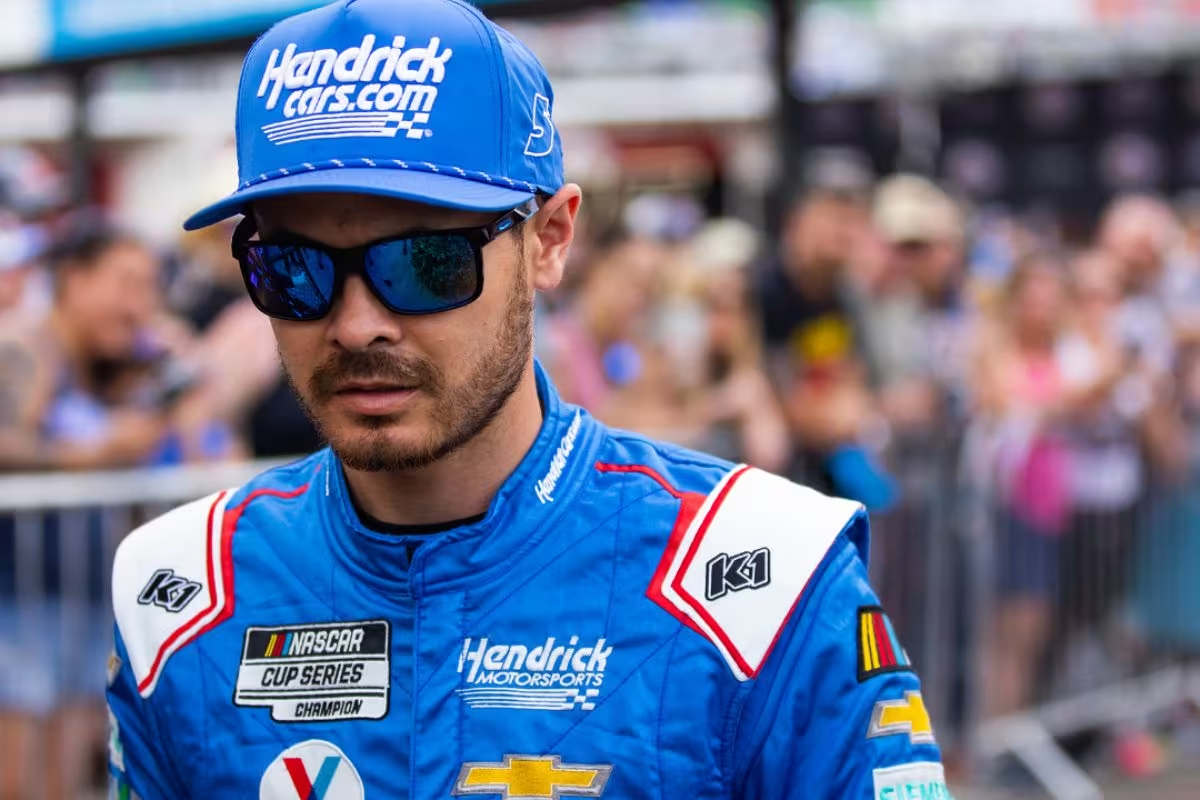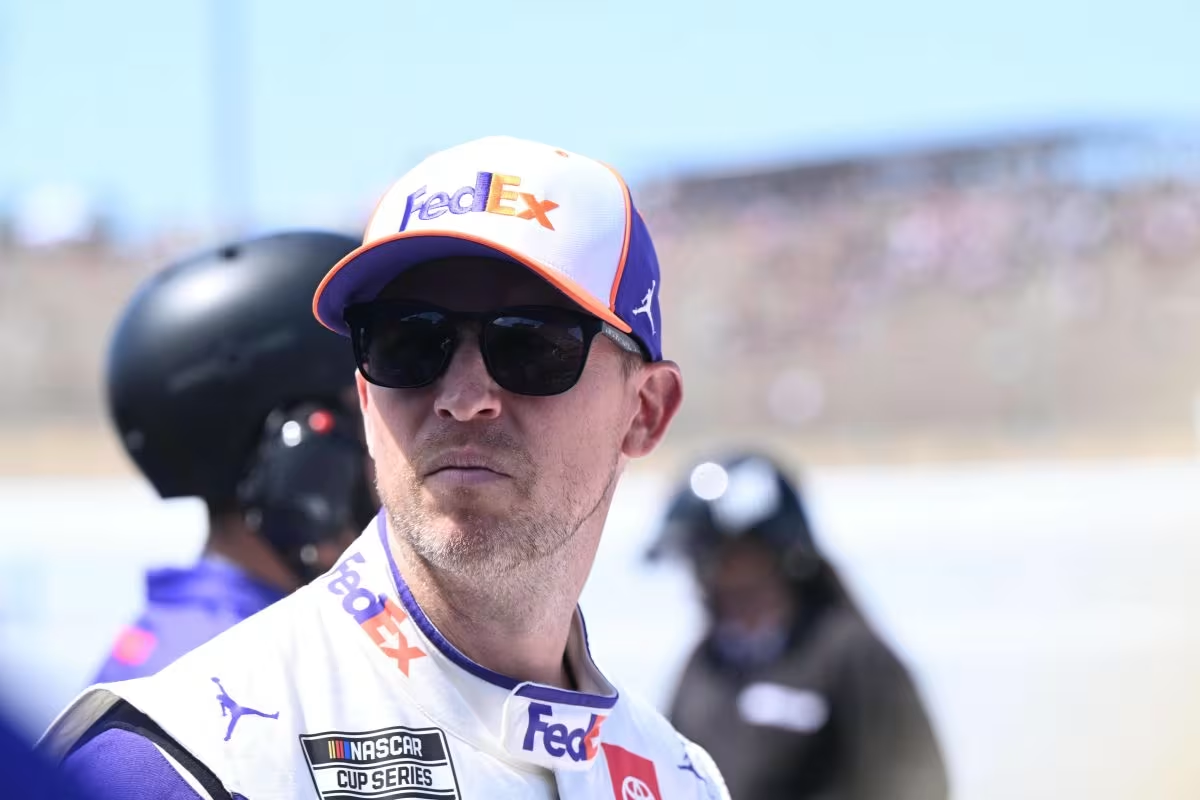Kyle Larson Calls Out NASCAR’s Greedy Practices: Tensions are rising between NASCAR and its teams, and the stakes have never been higher. After a bold move by 23XI Racing, a lawsuit against NASCAR has changed the game. Concerns about a lack of transparency in financial dealings and revenue sharing have led to allegations of greed, prompting urgent calls for change. What are the main issues behind this unrest? How do drivers like Kyle Larson see the financial struggles in NASCAR compared to other sports?
Key Highlights
- Kyle Larson’s criticism highlights growing frustration among drivers regarding declining paychecks and financial disparities in NASCAR.
- The charter system’s implications lead to perceived inequities in earnings, fueling accusations of greed within NASCAR management.
- NASCAR’s financial practices are compared unfavorably to those of the NFL and NBA, raising concerns about athlete retention and compensation.
- Teams express discontent over the lack of transparency in financial dealings, contributing to a sense of being “robbed” of fair earnings.
- The ongoing legal disputes reflect deeper issues regarding fairness and financial distribution, threatening the sport’s unity and sustainability.
Tensions Rise Between NASCAR and Teams
Why have tensions escalated between NASCAR and its teams? The recent discord can be traced back to a pivotal moment on September 6th, when 23XI Racing and Front Row Motorsports publicly challenged NASCAR’s operational practices. This act of defiance marked a notable turning point in the sport, revealing underlying grievances that had long simmered beneath the surface.
As these teams articulated their concerns, the situation quickly escalated into a serious confrontation, resulted in a lawsuit against NASCAR. This legal action signals a shift in the dynamics of power within the sport and has compelled prominent figures, including Kyle Larson, to scrutinize NASCAR’s practices more closely.
The reactions from the racing community reflect a growing discontent with NASCAR’s governance, particularly regarding issues of transparency and fairness. Teams are increasingly vocal about their frustrations surrounding financial distributions, regulatory inconsistencies, and the perceived lack of support from NASCAR’s leadership.
The tension is not merely a byproduct of isolated incidents; it encompasses broader issues that affect the sustainability and integrity of the sport. As teams unite in their stance against what they perceive as unfair practices, the potential for a schism within the sport looms larger.
Kyle Larson’s Comparison of NASCAR and Other Sports
Kyle Larson’s insights into NASCAR’s financial challenges reveal a pronounced contrast between the stock car racing series and other professional sports. While Larson’s own team owner, Rick Hendrick, has engaged in the charter system, Larson highlights a troubling reality: the economic landscape of NASCAR is faltering compared to other leagues. This contrast raises critical questions about the financial sustainability of NASCAR as a sport.
- NASCAR’s dwindling paychecks for drivers
- The charter system’s implications for earnings
- Comparisons with financial structures in leagues like the NFL and NBA
- The impact of these disparities on driver retention and talent acquisition
Larson’s observations underscore a unique dichotomy. Traditional sports leagues, such as the NFL and NBA, cultivate lucrative broadcasting deals and sponsorship arrangements that considerably improve player salaries and general team revenue.
In clear contrast, NASCAR’s financial model appears increasingly antiquated, struggling to provide equitable compensation for its athletes amid rising operational costs.
As Larson prepares to implement a charter system in his sprint car series, he recognizes the potential pitfalls of mirroring NASCAR’s current framework. The dichotomy between lucrative payouts in other sports and NASCAR’s stagnation could hinder the sport’s growth and appeal.
High Limit Racing’s Charter System and NASCAR’s Influence
Exploring the development of High Limit Racing‘s charter system reveals remarkable lessons derived from NASCAR‘s existing framework, particularly in view of recent legal challenges. Kyle Larson has emphasized the importance of establishing a fair charter system, drawing insights from NASCAR’s experience. He acknowledges that while High Limit Racing operates on a smaller scale, the complexity of creating equitable agreements remains crucial. This reflects the broader challenges faced by racing organizations in balancing competitiveness and financial viability.
“We’re currently looking at charter agreements and stuff in our series. Yeah, I think there’s stuff that could be learned from it all…for Brad and myself like we are drivers…I’ve been gradually close to Kasey Kahne. So yeah, we want it fair for everybody, so we’re trying. Obviously, it’s on a way smaller scale. Obviously, it’s not an easy charter…so yeah, we’re trying to figure this out.” – Larson
Larson’s observations highlight a concerning trend in the sport: while charters were initially thought to provide financial stability, they have inadvertently contributed to declining salaries for drivers, coaches, and staff. He pointed out that the salaries in NASCAR have not only stagnated but have actually diminished over the past two decades, a phenomenon rare in professional sports. This raises critical questions about the economic model underpinning both NASCAR and emerging series like High Limit Racing.
“Yeah, I hadn’t really thought about much until all of this…I mean, I think probably one of the only sports where athlete salaries have gone down in the last couple of decades…not just athletes, but (also) coaches, staff members – everybody, of course. Obviously, we would love to see a trend upward, instead of the opposite which has been…But to do that, the teams would probably need to make a lot of money to make it viable to pay the people.” – Larson
To reverse this trend, Larson suggests that teams must achieve greater profitability, thereby enabling them to invest more in their personnel. This imperative echoes the lessons learned from NASCAR’s charter system, which has faced examination over its financial implications.
“We want it fair for everybody” @KyleLarsonRacin says that the High Limit Sprint Car Series is looking into adopting a charter agreement, albeit on a smaller scale than NASCAR.
Larson also says that NASCAR is one of the only sports where athlete salaries have gone down in the… pic.twitter.com/YFLveswdij
— Frontstretch (@Frontstretch) October 5, 2024
As High Limit Racing develops its charter agreements, it must navigate these complexities to cultivate an environment where all stakeholders—drivers, teams, and support staff—can thrive. The effectiveness of this new system will ultimately depend on its ability to balance revenue generation with fair compensation, a challenge that continues to define the evolution of motorsports.
Focus on Racing Despite Lawsuit
While discussions surrounding the financial implications of charters and the evolving landscape of racing continue to gain traction, many drivers and team owners remain resolute in their commitment to the sport. This steadfast focus is evident even amid notable controversies, including ongoing lawsuits that threaten to overshadow the competition.
In the face of adversity, drivers like Kyle Larson and Denny Hamlin are vocalizing their concerns while maintaining a determined dedication to racing. The sport demands an extraordinary level of concentration and commitment, and drivers recognize that their primary objective must remain on the track.
Key considerations include:
- Maintaining Performance: Despite external pressures, drivers prioritize their competitive edge, understanding that on-track success is paramount.
- Unity Among Drivers: A growing solidarity among racers cultivates an environment where honest discussions about industry practices can occur without compromising racing goals.
- Focus on Team Dynamics: Team owners and drivers are aligning their strategies to navigate challenges while continuing to excel in races.
- Long-term Career Objectives: Drivers are also mindful of their future in the sport, ensuring that their focus remains on performance rather than being distracted by lawsuits or financial disputes.
Denny Hamlin’s Championship Goals
Ambition drives Denny Hamlin as he enters yet another season in pursuit of his premier NASCAR Cup Series championship. With 2024 marking his 19th year in the Cup Series, Hamlin remains undeterred in his quest for an elusive title. Despite the tumultuous backdrop of battling NASCAR executives in court, he maintains a singular focus on both protecting his team’s future and achieving competitive success.
Hamlin’s current standing—fifth in the rankings with two wins—demonstrates his relentless drive. His passionate competitiveness, as he articulates, is evident in moments that define his racing career. He stated, “I live for those moments. Anyone that knows me personally will tell you that these moments, you’ll typically get more out of Denny, because I hate to lose.” This mindset exemplifies not only his pursuit of victory but also his resilience amid adversity.
“Make no mistake, the competitor in me, you don’t think I don’t want to come out here and win this weekend more than any?”
“That’s what I fuel myself on, making the 18-footer on hole 18 to win the match. Like, I live for those moments. Anyone that knows me personally will tell you that these moments, you’ll typically get more out of Denny, because I hate to lose and certainly will not justify any excuses to losing.” – Hamlin
As Hamlin navigates the complexities of the season, it is clear that his ambition surpasses the challenges posed by litigation and organizational strife. Instead, it fuels his determination to ultimately secure that coveted championship, making his 2024 campaign one to watch.
News in Brief: Kyle Larson Calls Out NASCAR’s Greedy Practices
The escalating tensions between NASCAR and its teams highlight considerable concerns regarding financial practices within the organization. Kyle Larson’s critique, juxtaposing NASCAR with other professional sports, emphasizes perceived inequities faced by drivers and teams. The influence of NASCAR’s charter system, particularly through High Limit Racing, raises questions about the distribution of revenues and resources. Despite ongoing legal challenges, the focus remains on competitive performance, as exemplified by Denny Hamlin’s pursuit of championship aspirations, illustrating the complex dynamics at play.
ALSO READ: Kyle Larson’s Championship in Danger? Insider Warns About His Major Upcoming Weakness



